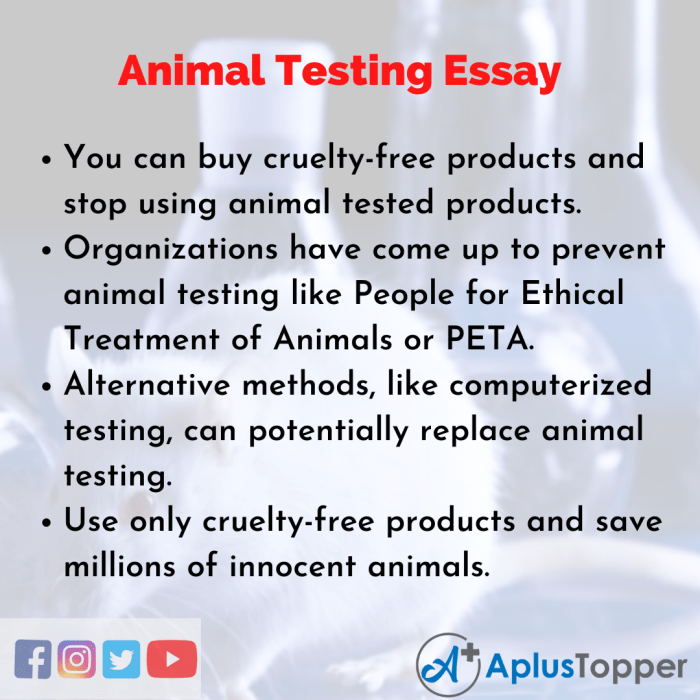In this persuasive speech on animal testing, we embark on a critical examination of the ethical and scientific implications of using animals in research. We will explore the potential for pain and suffering, the scientific validity of animal models, and the availability of alternative methods.
Join us as we delve into this complex issue, weighing the potential benefits against the moral concerns and seeking a balanced perspective.
Animal testing has been a contentious topic for decades, with strong arguments on both sides. Animal rights activists argue that it is cruel and unnecessary, while scientists maintain that it is essential for medical progress. In this speech, we will examine both sides of the debate and provide a comprehensive overview of the issue.
Animal Testing: Ethical Concerns
Animal testing has been a contentious issue for decades, raising concerns about the potential for pain and suffering inflicted on animals. Proponents of animal rights argue that animals are sentient beings deserving of moral consideration and that using them for experimentation is ethically wrong.
Specific cases, such as the use of primates in invasive brain experiments or the testing of cosmetics on rabbits, have sparked outrage and public outcry. Animal rights groups contend that these practices cause unnecessary pain and distress to animals and violate their inherent rights.
Those who believe animal testing is morally wrong often draw parallels to human experimentation, arguing that it is unacceptable to inflict suffering on any living creature for the sake of scientific advancement. They advocate for the development and adoption of alternative methods that do not involve the use of animals.
Animal Testing: Scientific Validity

Animal testing has been a valuable tool in medical research, providing insights into human biology and disease processes. Animal models have contributed to the development of numerous treatments and cures for various illnesses, including cancer, HIV/AIDS, and heart disease.
The ability of animal testing to predict human responses is a critical factor in its scientific validity. Animal models share physiological and genetic similarities with humans, allowing researchers to study the effects of drugs and treatments in a controlled environment.
However, animal testing also has limitations. Animal models cannot fully replicate human biology, and there can be significant differences in drug metabolism, toxicity, and efficacy between species. This can lead to false positives or negatives in animal studies, highlighting the need for caution when extrapolating results to humans.
Alternatives to Animal Testing

In response to ethical concerns and the limitations of animal testing, researchers have explored alternative methods that do not involve the use of animals. These alternatives include:
- In vitro testing: Using human cells or tissues in laboratory settings to study drug effects.
- Computer modeling: Simulating human biology and disease processes using computational methods.
- Microdosing: Administering small doses of drugs to humans in early clinical trials to assess safety and efficacy.
While these alternatives have advantages over animal testing, they also have limitations. In vitro testing may not fully capture the complexity of human physiology, and computer models can be limited by the accuracy of the data they are based on.
Microdosing can be costly and time-consuming, and it may not be suitable for all types of research.
Legal and Regulatory Framework
The use of animals in research is regulated by laws and guidelines in different jurisdictions. These regulations aim to ensure the ethical treatment of animals and to minimize pain and suffering. Regulatory bodies, such as the Institutional Animal Care and Use Committees (IACUCs), oversee animal research protocols and ensure compliance with ethical standards.
Enforcing animal welfare regulations can be challenging, and there have been cases of non-compliance and animal mistreatment. Ongoing oversight and collaboration between researchers, regulatory bodies, and animal welfare organizations are essential to ensure the responsible use of animals in research.
Public Perception and Advocacy: Persuasive Speech On Animal Testing
Public perception of animal testing has a significant impact on policy and research practices. Animal rights groups have played a crucial role in raising awareness about the ethical concerns associated with animal testing and advocating for alternative methods.
Successful advocacy efforts have led to changes in legislation and increased funding for non-animal research. Animal rights groups use various strategies to mobilize support, including public campaigns, lobbying, and collaboration with scientists and policymakers.
FAQ Insights
Is animal testing necessary?
Animal testing is not always necessary. There are many alternative methods that can be used to test the safety and efficacy of new products. However, in some cases, animal testing may be the only way to get the information that is needed.
Is animal testing cruel?
Animal testing can be cruel, but it does not have to be. There are many ways to minimize the pain and suffering of animals used in research. Animals should only be used in research when there are no other alternatives, and they should be treated with the utmost care and respect.
What are the alternatives to animal testing?
There are many alternatives to animal testing, including in vitro testing, computer modeling, and human clinical trials. These alternatives are often more humane and less expensive than animal testing, and they can provide just as much information.